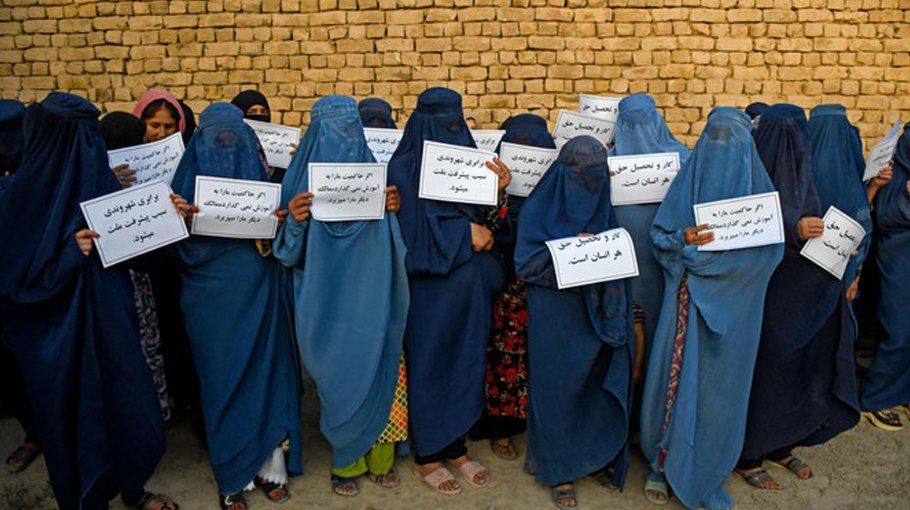How the Taliban is crushing Afghan women’s rights

"We are going to allow women to study and work within our framework. Women are going to be very active in our society," the Taliban announced in their first press conference shortly after seizing power on 15 August 2021.
Two years on, these assurances have been firmly demolished by the Taliban government's actions. The suppression of women's rights under their rule is the harshest in the world, brought in through a relentless series of religious decrees from the Taliban leadership, and regional rulings that have been steadily imposed across Afghanistan.
During each of these moments, the BBC has been on the ground speaking to Afghan girls and women - documenting grief, fear, hope and resolve as their lives and world have shrunk.
September 2021 - Bar on girls' secondary schools
The first indication of the Taliban's attitude to women came a month after the takeover. Secondary schools opened for boys following a ministry of education statement which made no mention of girls.
"Locally, we were told not to attend classes," a 17-year-old female student told us in Kabul at the time. "For 11 years, despite the risk of violence, I worked hard so I could become a doctor. I'm devastated," she wept, as she waved goodbye to her brothers heading off to school.
In the same week, female employees of the Kabul city administration were told by the mayor to stay at home, with only those who performed jobs which couldn't be done by men, allowed to continue.
But still, some women felt hope. "They've kept universities open, so I think they will change their policy soon," one university student told us.
At the time, we visited the headquarters of the Taliban's moral police, the Ministry of the Propagation of Virtue and the Prevention of Vice. It had been set up in the same compound where the Ministry of Women's Affairs of the former regime once was - a government department scrapped by the Taliban weeks after taking power.
We were told women were allowed into the ministry, but we didn't see any.
"Why have you closed schools for girls?" I asked a Taliban spokesman sitting in the compound, surrounded by Taliban fighters.
"Girls themselves aren't going to school," he replied.
When challenged, he said: "We will open schools for girls across the country. We are working to improve the security situation."
December 2021 to March 2022 - Travel restrictions and broken promise on secondary education
Women responded to the restrictions by marching on the streets of Afghan cities, demanding the right to work and study. They were violently stopped by the Taliban government on multiple occasions.
"I was lashed with electric cables," one protester told us in a discreet meeting in one of her friend's homes. She'd been moving from place to place, fearing she'd be caught.
In January 2022, at least four female activists were detained - they were held for weeks and beaten in custody.
Restrictions were being brought in incrementally. In December 2021, the government's virtue and vice ministry ordered that women travelling distances longer than 72km (45 miles) must be accompanied by a close male relative.
Then suddenly, there was a glimmer of hope.
On 21 March 2023, the Taliban education department announced "all students" would be able to return to school at the start of the new academic term.
Multiple Taliban officials told us that girls' schools would reopen.
Two days later, a BBC team watched female students filter into the Sayed ulShuhadaschool, wiping dust off their desks, chattering excitedly as they returned to their classrooms. But within minutes, the mood had turned.
A local Taliban education official had forwarded the headteacher a WhatsApp message, saying girls' secondary schools would remain closed until further notice.
Many students burst into tears. "What kind of country is this? What is our sin?" one called Fatima said.
The Taliban government itself has been guarded when explaining its actions - calling them a return to traditional Islamic and Afghan values. Meanwhile, many ultra conservative clerics, tribal elders and their followers are part of the government's support base which helped them seize power in Afghanistan, and we've been told there are fears within the government that it could lose that support if it makes any move that goes against the elders' beliefs
Less than two months later, on 7 May 2022, the government announced a decree endorsed by its supreme leader Mullah HaibatullahAkhundzada, mandating head-to-toe clothing for women.
"Those women who are not too old or young must cover their faces, except the eyes," it read.
It also ordered that male family members should ensure that women and girls comply, or they would face action.
On the ground we could see a change in how many women were visible on the streets, and how they were dressed.
Women who had worn long colourful tunics, a hijab, jeans and high heels told us they had begun to wear loose black abayas (gowns), a hijab, a surgical mask to cover their faces and trainers or boots.
More women also began to wear black burkas.
"We don't care what we have to wear if that means they allow us to study and work," one explained.
While women began to disappear from public life, the number of destitute women, who had been denied the right to work and the ability to feed their families, were increasingly visible on the streets begging for help.
We began to hear of more and more girls being forced into early marriages by their families, because they were not able to get an education or a job.



